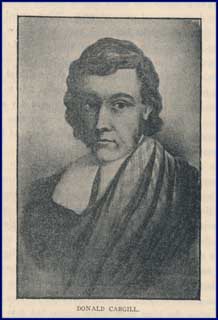by archivist |
Three Hundred Years of Application . . . and CountingWritten by Rev. David T. Myers
This author still possesses all three volumes in his personal library. Bought while a Sophomore in college in 1960, the publishing date of their reprint, Thomas Watson's one-hundred and seventy six sermons on the Westminster Catechisms of the Westminster Assembly are timeless in their assistance to every child of God who desires to know theology and have it applied to his or her spiritual life. I can testify to that, having underlined and proclaimed many truths from their pages for the edification of all Christians during my forty years in the pastorate.
The remarkable truth about their author is that we do not know either the time of his birth or the death of it either. They are missing from the history of the church, and known only by God. However, we do know that he was buried on this day in history, July 28, 1686, and so we write this brief biography on his life. Much of the latter is taken from a brief memoir written by none else than Charles Spurgeon.
Thomas Watson attended and graduated from Emmanuel College, Cambridge with a B.A. Degree in 1639 and a Master's degree in 1642. It was said that he was a laborious student, prompting Spurgeon to quip “the conscientious student is the most likely man to become a successful pastor.” Watson went on to be just such a preacher at a Church of England parish and church called St. Stephen's, Walbrook in London, England. But let there be no doubt here. Watson was a Presbyterian through and through. And to his congregation, many came, or as Spurgeon put it, the church was filled constantly with worshipers.
Among his sermons during those sixteen years was, as mentioned above, a thorough proclamation of the principle themes of the Westminster Confession of Faith. This author has in his years of ministry in catechetical studies among the covenant children of the church, adult studies in the Sunday School and Bible studies, and yes, even sermons from the sacred desk, used Watson's thorough grasp of biblical texts, clear expositions of Bible doctrine, and practical applications. It might be 300 years old, but biblical truths such as these do not ever pass away in teaching and application.
There is found in two of his three books on the title page this phrase “Ejected by the Act of Uniformity.” We have mentioned before about that terrible act which threw out the Puritan members of the Clergy in the Church of England, countless of whom were Presbyterian clergy. Yet in the next 20 years until his death and burial in 1686, Watson continued on in the proclamation of the Word of God wherever people would come to hear him. Due to a weakening in his health, he was praying in his closet when he departed from this earth.
Words to Live By:I read on the web recently something which disheartened me. Among the characteristics of a church pulpit committee was that they were looking for a minister who had a well known name! The apostle Paul to the Corinthians would write in 1 Corinthians 2:4, 5, “my message and my preaching were not in persuasive words of wisdom, but in demonstration of the Spirit and of power, so that your faith would not rest on the wisdom of men, but on the power of God.” The fault is ours, is it not, brothers and sisters in Christ, that we pay too much attention to the outward and external characteristics of those who minister to us the Word of God, and not enough attention to the plain and simple proclamation of the Word of God as empowered by the Spirit of God? If we want the spiritual power of the days of yesterday, we must set our hearts on men who are filled with the Spirit of God, who preach the whole counsel of God.


